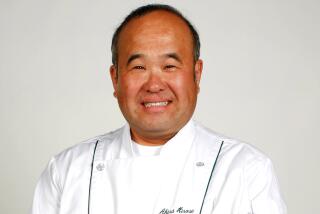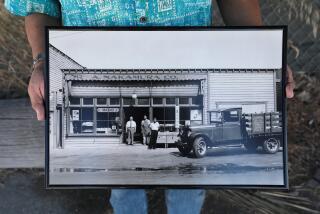A Nation Apologizes : Japanese Restaurateur Was Denied Citizenship, but His Home Is Being Declared a Landmark
RIVERSIDE â He loved America with a passion.
For years he operated a cafe here called the Washington Restaurant, named for one of his heroes, George Washington. A portrait of every U.S. president hung on its walls.
He was bashful, quiet and hard-working, never in any trouble. He and his wife raised five children, and sent them all to college. One became a doctor, two became dentists. âEducation is something no one can take away from you,â he often told them as they were growing up.
For all his loyalty, Jukichi Harada was never allowed to become an American citizen, and he died in an isolated World War II internment camp.
Nonetheless, he left his mark.
Seventy-five years ago, the state of California, acting on the complaints of neighbors, tried to confiscate the Harada home as a violation of the Alien Land Law.
It was the first test of the law, and in a landmark ruling, California lost.
The other dream that Harada chased all his life eluded him. It was not until 1952, eight years after he died, that foreign-born Japanese were at last allowed to become American citizens.
Now, nearly 90 years after Harada came here, his house has been declared a National Historic Landmark.
âDad was chasing a dream. Thatâs why he came to America in 1903, when he was 28. His dream was America, but America would never have him,â said his daughter, Sumi, now 81, who still lives in the house.
A letter from President Bush came for her earlier this year, saying: âWe can never fully right wrongs of the past,â and apologizing in the name of the American people because she and her family were sent to relocation camps.
âFather would be pleased about President Bushâs letter,â said Harada. âHe would be proud this house has been designated of historic importance to the America he loved so much.â
Through all the years he lived here, Jukichi Harada applied for American citizenship time and again to no avail. He knew he would be turned down, but he persisted.
âI have lived in America now a long time. My heart is American. All my sympathies are with the Americans. I think American, but the law will not let me become an American,â he told Los Angeles Times reporter Harry Carr in 1916.
Carrâs story about Jukichi Harada took up nearly half the front page of the Oct. 22, 1916, issue of The Times. Similar stories appeared on the front pages of newspapers across the nation and around the world.
Accompanying those stories were photographs of Harada and his son, Yoshizo, and of the two-story, 10-room house on Lemon Street in Riverside, which Harada bought in 1915.
After the Haradas moved in there was a storm of protest. Sixty families signed petitions demanding that they be evicted; no one, it seemed, wanted a Japanese family in their neighborhood.
The state, acting on the complaints, filed suit to confiscate the Harada home as a violation of the Alien Land Law.
When Harada bought the house he listed on the deed as owners the three children he had at that time: Mine, 9, Sumi, 5, and Yoshizo, 3. They were born in the United States, and âas American citizens they have a right to own property here,â their father insisted.
âI wonât sell. You can murder me. You can throw me into the sea. I wonât sell.â
The state argued that Harada had put the house in his childrenâs names to get around the law. Two years later, Riverside County Superior Judge Hugh Craig ruled that the three children could own the house.
âAs American citizens they are entitled to equal protection under the law, the same as anyone else, no matter what their parentage,â Craig found. His ruling was upheld by the state Supreme Court.
Sumi Harada is the only surviving child. She never married.
Last month, she received another letter, this one from Edwin C. Bearss, chief historian of the National Parks Service. âThe Harada House has been found to possess national significance in the history of the United States,â he wrote. âIt has been declared a National Historical Landmark.â
Her father and mother died in Utah during World War II, behind a barbed-wire enclosure guarded by armed soldiers.
More to Read
Sign up for Essential California
The most important California stories and recommendations in your inbox every morning.
You may occasionally receive promotional content from the Los Angeles Times.






![[20060326 (LA/A20) -- STATING THE CASE: Marchers organized by unions, religious organizations and immigrants rights groups carry signs and chant in downtown L.A. "People are really upset that all the work they do, everything that they give to this nation, is ignored," said Angelica Salas of the Coalition of Humane Immigrant Rights. -- PHOTOGRAPHER: Photographs by Gina Ferazzi The Los Angeles Times] *** [Ferazzi, Gina -- - 109170.ME.0325.rights.12.GMF- Gina Ferazzi/Los Angeles Times - Thousands of protesters march to city hall in downtown Los Angeles Saturday, March 25, 2006. They are protesting against House-passed HR 4437, an anti-immigration bill that opponents say will criminalize millions of immigrant families and anyone who comes into contact with them.]](https://ca-times.brightspotcdn.com/dims4/default/34f403d/2147483647/strip/true/crop/1983x1322+109+0/resize/840x560!/quality/75/?url=https%3A%2F%2Fcalifornia-times-brightspot.s3.amazonaws.com%2Fzbk%2Fdamlat_images%2FLA%2FLA_PHOTO_ARCHIVE%2FSDOCS%2854%29%2Fkx3lslnc.JPG)



